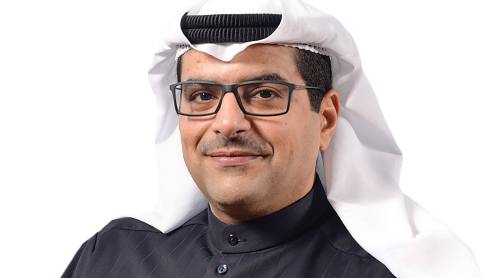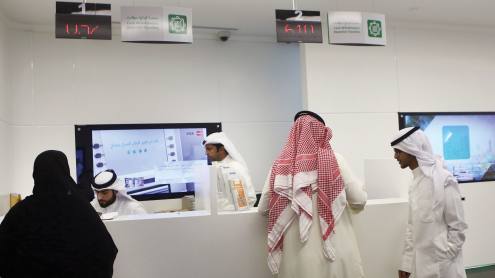Q: What is the Central Bank of Kuwait’s [CBK's] expectation for economic growth in Kuwait in 2020?
A: Our initial estimates for national accounts statistics indicate real gross domestic product growth of 0.4% in the third quarter of 2019 year on year, after increasing by 2.6% and 0.4%, respectively, during the first and second quarters. Growth was driven mainly by the strong non-oil growth [7.8% during the third quarter].
Lower oil prices and uncertainty about output still cloud the outlook. While oil prices started the year strongly on the back of the US-China trade deal, the outbreak of coronavirus has battered prices, given its potential ramifications for Chinese and global oil demand.
Further reading
- Kuwait’s fiscal buffers bring breathing space
- Kuwait’s prudence pays off ahead of crisis
- Kuwait and allies mull co-operation with non-OPEC producers
- Kuwait Finance House chief looks to life after AUB acquisition
- Reforms put Kuwaiti stocks on investors' radars
- Kuwait’s corporate governance is put to the test
On a positive note, thanks to the steps taken by the government, Kuwait’s standing in the World Bank’s Doing Business ranking has improved by 14 places (from 97 to 83) as the business environment witnessed reforms in seven out of 10 components of the index. Additional reforms are likely to support the business climate and foreign direct investment further, which in turn will help non-oil growth.
Q: What is the broad outlook for Kuwait’s banking sector in the next 12 to 18 months?
A: We expect the banking sector to remain sound and stable in the near term, and our quarterly stress-testing exercise supports that view.
Our banking industry enjoys strong capital and liquid positions, evident from its capital adequacy ratio of 18.5% and liquidity coverage ratio of about 197%. An uptick in the ratio of non-performing loans from its existing historically low level of 1.5% can’t be ruled out, given the slim margin for its further decline. Still, high provisions would continue to support an active write-off policy, helping banks avoid any serious formation of [bad] loans on their books. In fact, ample provisions have already helped banks smoothly transition towards IFRS 9 rules where applicable [as banks are required to maintain provision under the CBK rules or the IFRS 9 standards, whichever is greater].
Q: Where do you expect credit growth to come from in 2020-21?
A: Credit off-take in the year ahead will depend upon a number of factors, in particular on the nature and size of government expenditures, with current spending helping consumers (through higher wages and salaries) while stronger capital expenditures will give a boost to project financing in the relevant sectors. In recent years, demand for bank credit from the oil and gas sector has also increased, albeit from a low level.
In late 2018 we increased the maximum level of consumer loans from Kd15,000 [$48,250] to Kd25,000, while keeping the maximum residential loans at Kd70,000, lifting the total lending limit to Kd95,000. This has given the banking sector some additional room for expansion into a segment that is fairly safe, given the job security and higher salaries.
We're trying to expand in other sectors such as small and medium-sized enterprises [SMEs]. The banking sector enjoys ample liquidity which needs to be utilised well, not just in government projects and personal loans but also to jump start other sectors such as SMEs, tourism and the wider corporate and private sector. We’ve asked the banking sector to look at this in their strategies.
Q: What are the key changes that CBK has introduced in its supervisory and regulatory frameworks for banks?
A: In view of banks’ growing exposure to Gulf Co-operation Council [GCC] sovereign bonds and given the recent rating downgrades in some of the GCC countries, CBK decided to amend its Basel III guidelines by removing the preferential treatment that was earlier allowed for GCC sovereign exposures when calculating the capital adequacy ratio. Moreover, preferential treatment for host countries was also limited to the extent of the liquidity requirement in those jurisdictions.
In the case of Islamic banks, we further strengthened our monitoring of the specific risks associated with Islamic financing instruments such as sharia non-compliance risk or displaced commercial risk. Moreover, we have required the staff in sharia audit units/departments of Islamic banks to obtain necessary certification in sharia audits from the Institute of Banking Studies, Kuwait. This will help upgrade the skills of banks’ staff to a minimum required standard.
Internally, in line with our efforts to vigilantly monitor systemic risk and implement an effective macro-prudential policy to further strengthen the resilience of our financial system as a whole, we have established a dedicated Macro-Prudential Supervision Unit within our Financial Stability Office.
Q: What is the latest update on country’s credit bureau? What developments can be expected in the near future?
A: In early 2019, the government replaced the old credit information law of 2001 with new legislation. Specifically, the Credit Information Law of 2019 aims to widen the operational scope of credit bureaus, designates CBK as their regulator, requires the bureaus to assign a credit score to all individuals and corporates, and places emphasis on consumer protection by introducing a formal dispute resolution mechanism.
Since the passing of the legislation, Kuwait’s rank in the ‘getting credit’ component of the World Bank’s Doing Business ranking has registered a 10-point increase. As a result, Kuwait moved up 14 places in the overall ranking, making the country among the top 10 improvers across the world.
The promulgation of the new Credit Information Law has provided necessary legal infrastructure for the effective operations of credit bureaus in the country. This will help improve the quality and analysis of credit information, thus reducing the information asymmetry between lenders and borrowers and improving financial intermediation.
Q: The International Monetary Fund recently recommended relaxing lending rate caps in order to expand access to credit for SMEs and the wider corporate sector. Do you have any plans for such a relaxation of caps?
A: We have put in place the caps to ensure that consumers are not charged excessive rates as that might spike debt-servicing pressures with attendant delinquencies. In the case of corporates, our caps are not binding, given the fact that banks are not charging the corporates even up to the upper limit permissible under the caps. Regarding the SMEs, the real challenge is not the lack of credit availability but in creating a vibrant SME sector in an economy where the public sector still dominates.
Q: What are the latest developments with the regulatory sandbox for fintech firms? What new initiatives is the CBK planning to help stimulate fintech innovation in Kuwait?
A: We have adopted an enabling and proportionate regulatory approach towards innovation, using a tiered process of introducing rules in accordance with the risks involved. Accordingly, we have introduced a regulatory sandbox to provide a safe testing place for innovative products or services by banks or new start-ups before their full-scale introduction to end users.
Any entrepreneur, whether an individual or a company, can avail themselves of the regulatory sandbox where we will evaluate the technical, security, regulatory and other aspects of the product, service or solution and help refine the same in a controlled environment. Upon successful completion of all the steps and formalities, entrepreneurs will have the choice to offer their innovative solutions to the public, whether independently or through existing banking platforms.
At present, a few innovative products are at an experimentation stage in our regulatory sandbox; however, their fate, in terms of formal launch or otherwise, has yet to be determined. We have also expanded our regulatory sandbox to include fintech products or services that are based on, or relevant to, electronic payment of funds.
Going forward, we intend to explore the concept of know your customer and the need for issuing commensurate regulations. Moreover, we are also planning to open up our regulatory sandbox to all the GCC countries, a step that will help attract innovators from across the region to offer a wider range of potential products and services.
Q: Kuwait Finance House’s shareholders approved the acquisition of Bahrain’s Ahli United Bank in January. Is there likely to be further consolidation within the sector, given similar moves around the Gulf region?
A: It is something we’d encourage if it is suitable and beneficial for the bank, the financial sector and the wider economy, but we don’t want to impose such moves. We’re not anticipating any further mergers for the time being.
For Kuwait Finance House, it has seen a clear opportunity. We studied it thoroughly because it is an overseas transaction, not a regular [domestic] transaction. So we had to open [Ahli United Bank’s books] and do our thorough due diligence, before giving our conditional approval to the deal.
This interview was conducted in late February 2020, before the economic impacts of the coronavirus outbreak had become prominent.













